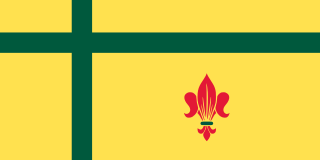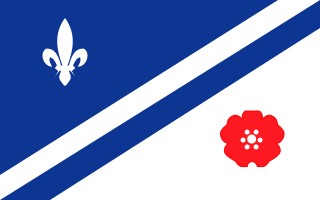Education in Quebec is governed by the Ministry of Education and Higher Education. It was administered at the local level by publicly elected French and English school boards, changed in 2020 to school service centres. Teachers are represented by province-wide unions that negotiate province-wide working conditions with local boards and the provincial government of Quebec.

The Quebec Liberal Party is a provincial political party in Quebec. It has been independent of the federal Liberal Party of Canada since 1955. The QLP has always been associated with the colour red; each of their main opponents in different eras have been generally associated with the colour blue.
In Canada, an allophone is a resident whose first language is neither French nor English. The term parallels anglophone and francophone, which designate people whose mother tongues are English and French, respectively. Some sources do not consider native speakers of Indigenous languages to be allophones.

The Manitoba Schools Question was a political crisis in the Canadian province of Manitoba that occurred late in the 19th century, attacking publicly-funded separate schools for Roman Catholics and Protestants. The crisis was precipitated by a series of provincial laws passed between 1890 and 1896, and another passed in 1916.
The Charter of the French Language, also known in English as Bill 101, Law 101, or Quebec French Preference Law, is a law in the province of Quebec in Canada defining French, the language of the majority of the population, as the official language of the provincial government. It is the central legislative piece in Quebec's language policy, and one of the three statutory documents Quebec society bases its cohesion upon, along with the Quebec Charter of Human Rights and Freedoms and the Civil Code of Quebec. The Charter also protects the Indigenous languages of Quebec.

Franco-Manitobans are French Canadians or Canadian francophones living in the province of Manitoba. According to the 2016 Canadian Census, 40,975 residents of the province stated that French was their mother tongue. In the same census, 148,810 Manitobans claimed to have either full or partial French ancestry. There are several Franco-Manitoban communities throughout Manitoba, although the majority are based in either the Winnipeg Capital Region or the Eastman Region.
The Official Languages Act is a Canadian law that came into force on September 9, 1969, which gives French and English equal status in the government of Canada. This makes them "official" languages, having preferred status in law over all other languages. Although the Official Languages Act is not the only piece of federal language law, it is the legislative keystone of Canada's official bilingualism. It was substantially amended in 1988. Both languages are equal in Canada's government and in all the services it controls, such as the courts.
This article presents the current language demographics of the Canadian province of Quebec.

Fransaskois, , Franco-Saskatchewanais or Franco-Saskatchewanians are French Canadians or Canadian francophones living in the province of Saskatchewan. According to the 2016 Canadian Census, approximately 17,735 residents of the province stated that French was their mother tongue. In the same census, 125,810 Saskatchewanians claimed full or partial French ancestry. There are several Fransaskois communities in Saskatchewan, although the majority of francophones in Saskatchewan reside in the province's three largest cities, Saskatoon, Regina, and Prince Albert.
The legal dispute over Quebec's language policy began soon after the enactment of Bill 101, establishing the Charter of the French Language, by the Parliament of Quebec in 1977.

The official languages of Canada are English and French, which "have equality of status and equal rights and privileges as to their use in all institutions of the Parliament and Government of Canada," according to Canada's constitution. "Official bilingualism" is the term used in Canada to collectively describe the policies, constitutional provisions, and laws that ensure legal equality of English and French in the Parliament and courts of Canada, protect the linguistic rights of English- and French-speaking minorities in different provinces, and ensure a level of government services in both languages across Canada.
The Commission of Inquiry on the Situation of the French Language and Linguistic Rights in Quebec was established under the Union Nationale government of Jean-Jacques Bertrand on December 9, 1968.

Franco-Albertans are francophone residents of the Canadian province of Alberta. Franco-Albertans may also refer to residents of Alberta with French Canadian ancestry, although publications from the government of Alberta use the term Franco-Albertan to refer to its francophone residents. In the 2016 Canadian Census, there were 86,705 Albertans that stated their mother tongue was French. In the same census, there were 411,315 Albertans that claim partial or full French ancestry.

French immersion is a form of bilingual education in which students who do not speak French as a first language will receive instruction in French. In most French-immersion schools, students will learn to speak French and learn most subjects such as history, music, geography, art, physical education and science in French.
Section 23 of the Canadian Charter of Rights and Freedoms is the section of the Constitution of Canada that guarantees minority language educational rights to French-speaking communities outside Quebec, and, to a lesser extent, English-speaking minorities in Quebec. The section may be particularly notable, in that some scholars believe that section 23 "was the only part of the Charter with which Pierre Trudeau was truly concerned." Trudeau was the prime minister who fought for the inclusion of the Charter of Rights in the Constitution of Canada in 1982.

With access to six universities and twelve junior colleges in an 8 kilometre (5 mi) radius, Montreal, Quebec (Canada) has the highest proportion of post-secondary students of all major cities in North America. This represents roughly 248,000 post-secondary students, one of the largest numbers in the world.
Because the country contains two major language groups and numerous other linguistic minorities, in Canada official languages policy has always been an important and high-profile area of public policy.
The language policies of Canada's province and territories vary between the provinces and territories of Canada. Although the federal government operates as an officially bilingual institution, providing services in English and French, several provincial governments have also instituted or legislated their own language policies.
Guy Rivard is a Canadian former politician in the province of Quebec. Rivard served in the National Assembly of Quebec from 1985 to 1994 as a member of the Liberal Party and was a junior minister in the government of Robert Bourassa. His handling of Quebec's language laws in 1989 attracted national attention.
English-speaking Quebecers, also known as Anglo-Quebecers, English Quebecers, or Anglophone Quebecers or simply Anglos in a Quebec context, are a linguistic minority in the francophone province of Quebec. According to the 2011 Canadian census, 599,225 people in Quebec declare English as a mother tongue. When asked, 834,950 people reported using English the most at home.







